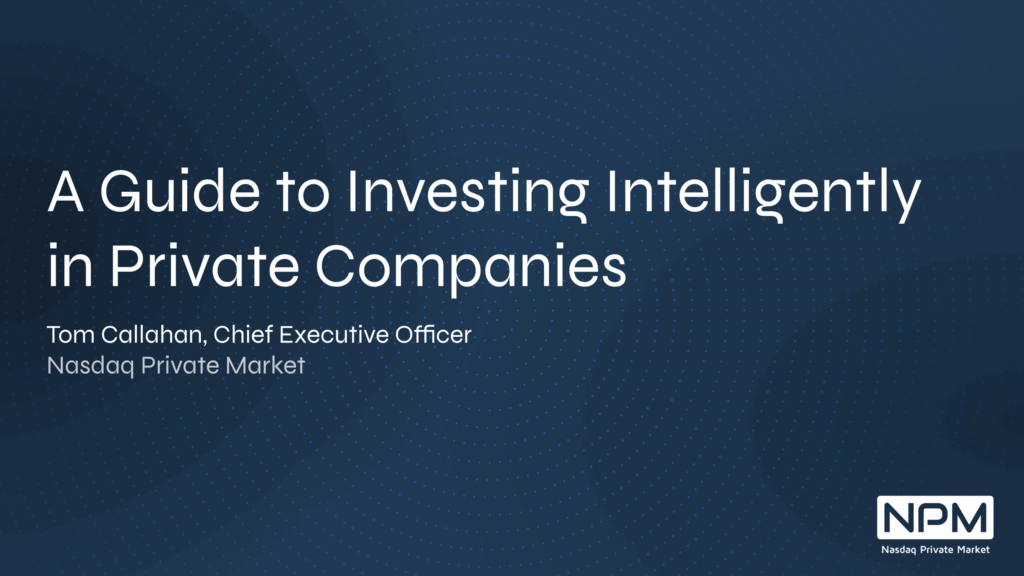The complexities of how to sell private company shares can often feel like a maze for shareholders, from understanding your eligibility to sell stock to navigating the secondary market for selling private company stock, this article explores the process and asset class. Unlocking liquidity through private secondary market transactions can be important for a shareholder’s financial well-being. Understanding the processes and implications of selling shares in a privately held company, including valuation, company approval, and tax implications, is important for anyone looking to liquidate their equity stakes efficiently and effectively.
This article offers a guide to important elements of selling private company shares, covering essential topics such as preparing for sale, choosing the best method to sell private shares, and navigating the landscape of legal and regulatory considerations. Key aspects, such as a company valuation, engaging with buyers, compliance considerations and shareholder rights, will be analyzed in detail.
Understanding Private Company Shares
Private company shares represent equity ownership in companies that are not listed on public stock exchanges. Unlike public companies, where shares are traded in the open market, private company shares are traded privately, often making the valuation and sale process more complex and less transparent.
Definition and Characteristics
Private company shares are typically held by founders, early investors, and employees with equity compensation. These shares are bound by company-specific agreements, which include vesting schedules or restrictions on how and when shares can be sold, such as rights of first refusal or lock-up periods following an initial investment. The valuation of these shares is not determined by the open market but through negotiations based on financial performance, future prospects of the company, and market conditions.
Risks and Benefits
Owning private company shares carries a unique set of risks and benefits. One of the primary risks involves liquidity. Shareholders may find it challenging to find buyers for their shares, as there is no public market facilitating daily trades. Additionally, the lack of transparency in financial disclosures can make it difficult to assess the true value of the shares.
On the benefit side, owning private company shares can offer substantial returns, especially if the company grows significantly. Shareholders have the potential to earn returns that may exceed those available from public markets, particularly if they invest early in a company’s lifecycle.
Understanding these characteristics, risks, and benefits is crucial for anyone considering selling their private company shares. It ensures that shareholders are better equipped to make informed decisions and navigate the complexities associated with such transactions.
Preparing to Sell
Valuing Your Shares
Valuing private company shares is a complex process due to the lack of publicly available trading data. A common method for valuing shares is based on the company’s valuation at the last funding round. This valuation is publicly available because it is typically disclosed during the fundraising process, where the company must share its valuation with potential investors to secure funding.
Another commonly used private company stock valuation methodology is Precedent Transactions Analysis which examines past sales of the company or similar company shares to determine a fair market value. This is a more timely pricing methodology because share prices since the last round may have changed. Examining past transactions can establish a benchmark for current share price. By leveraging data from previous transactions on the Nasdaq Private Market (NPM) platform, shareholders can gain insights into market trends and pricing strategies.
Accessing private company financials can be challenging. NPM offers resources for obtaining hard-to-source data that can aid in accurately identifying valuations. When preparing for sale, it’s essential to have an understanding of share value in order to attract potential buyers and negotiate effectively.
Obtaining Company Approval
Before completing the sale of private company shares, shareholders must secure approval from the company. Private companies have specific stipulations, such as the right of first refusal, which allows them to buy back the shares in place of a proposed buyer or transfer restrictions which allows the company to block the transaction. This process ensures that the company always maintains control over its ownership structure and adheres to any shareholder agreements. Shareholders can inquire about any existing buyback programs or third-party tender offers that may facilitate the sale of their shares. It is also crucial to understand the terms under which the shares were issued, as these may require company approval for any transfer of shares to a new entity. NPM remains committed to our alignment with private companies and operates in accordance with company equity administration policies.
Methods to Sell Private Shares
Listing Shares for Sale on Nasdaq Private Market
An effective method to sell private company shares is by posting them on the NPM SecondMarket® trading platform. The platform enables shareholders to sell their shares to investors by posting them on the private securities market, making them available to our network of institutional investors. The platform assists in helping sellers sell their shares, providing data about the private stock’s bid-ask spread, and managing the details as well as the progress of the transaction. SecondMarket® has robust analytics tools to help sellers make informed decisions by offering insights into market trends and investor behavior. By leveraging the SecondMarket® platform, shareholders can access a pool of potential buyers, increasing the likelihood of finding a credible institutional investor to buy their stock. NPM capabilities include facilitating transactions and providing a compliant environment for both sellers and buyers.
Company Buyback Programs and Tender Offers
Another method to sell private company shares is through company buyback programs or tender offers. These programs allow shareholders to sell their shares back to the issuing company or to company-sanctioned investors. This process ensures that the company can maintain control over its share distribution. Shareholders should consult with the company’s management team to understand any available buyback options.
A tender offer is a formal offer made by one or more third party investors who are chosen by the company to purchase some or all of the shareholders’ shares at a specified price. The company running the tender program will take several steps, including setting the offer price, determining the number of shares to be bought, and establishing the offer period during which shareholders can decide to sell their shares. This can provide an exit strategy for shareholders looking for liquidity while maintaining the company’s control over share ownership.
Legal and Regulatory Considerations
Selling private company shares involves navigating a complex landscape of legal and regulatory requirements to ensure compliance and avoid potential legal issues. Understanding these regulations is crucial for any shareholder considering a sale.
SEC Regulations
Although private company shares are not publicly traded, they are still subject to certain Securities and Exchange Commission (SEC) regulations. Shareholders must adhere to SEC guidelines to prevent unauthorized transactions. Shareholders looking to sell these shares may face restrictions unless they comply with specific SEC rules such as Rule 144, which allows selling restricted securities under certain conditions, such as holding periods and the manner of sale. The SEC actively monitors and limits excessive automated requests to its site to ensure fair access, emphasizing the importance of compliance with its operational guidelines.
Conclusion and Next Steps to Sell Your Shares
Throughout this guide, we have explored the strategic considerations involved in selling private company shares. By understanding the complexities of valuation, navigating regulatory frameworks, and engaging with the secondary market, shareholders can make more informed, empowered decisions. The insights provided aim to shed light on the sale process, ensuring shareholders are well-equipped to proceed with selling shares confidently.
As the landscape of selling private company stock continues to evolve, staying informed and leveraging expert resources remains paramount. For those looking to sell their private company stock, Nasdaq Private Market offers technology, support, and resources that enable employees of private companies to efficiently sell their shares with ease. Nasdaq Private Market helps shareholders navigate the sale process smoothly. The journey of selling private company shares, while complex, can offer a valuable opportunity for shareholders to realize the potential of their investment decisions.
Fast Facts: FAQs
1. What are the steps to sell your private company shares?
To sell shares of a private company, the shareholder needs to locate a buyer through a credible trading platform since these shares are not traded on public exchanges.
2. How are private company stock trades approved?
Every transfer of shares must receive approval from the company that issued the shares.
3. How do your private company shares get sold?
Your shares in a private company are sold through private secondary markets via trading platforms like NPM SecondMarket®.
4. What are the methods available for selling stock in a private company?
- There are several ways to sell your stock in a private company:
- You can sell the shares back to the company.
- You can sell the shares on a secondary marketplace to another buyer or investor.
- You can sell the shares during a tender offer, auction, or other liquidity event.
- You can sell the shares following an initial public offering (IPO).
5. How can I determine the value of my private company shares?
A common method for valuing shares is the company’s valuation at the last funding round. Another commonly used private company stock valuation methodology is Precedent Transactions Analysis which examines past sales of the company or similar company shares to determine a fair market value.





